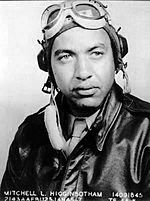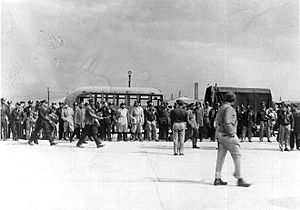Mitchell Higginbotham facts for kids
Quick facts for kids
Mitchell Higginbotham
|
|
|---|---|

Mitchell Higginbotham
|
|
| Born | March 2, 1921 |
| Died | February 14, 2016 (aged 94) |
| Nationality | American |
| Alma mater | University of ColoradoMS in Labor Relations |
| Occupation | U.S. Army Air Force |
| Years active | 1942-1946 (active), 1946-1962 (reserve) |
| Known for | Tuskegee Airmen |
| Relatives | Robert Higginbotham (brother) |
| Awards | Congressional Gold Medal awarded to the Tuskegee Airmen |
Mitchell Higginbotham (born March 2, 1921 – died February 14, 2016) was an officer in the U.S. Army Air Force. He was a brave member of the African American fighter pilot group known as the Tuskegee Airmen during World War II.
Contents
Life Story of Mitchell Higginbotham
Early Life and Family
Mitchell Higginbotham was born on March 2, 1921, in Amherst, Virginia. His parents were Plinkam L. and Hester Higginbotham. Mitchell had a younger brother named Robert. Robert also joined the U.S. military later on.
Military Service and the Tuskegee Airmen
Mitchell Higginbotham joined the U.S. military in the summer of 1942. He was accepted into a special pilot training program at Tuskegee Army Airfield. He finished his training on February 1, 1945. At that time, he became a Second Lieutenant, which is a junior officer rank.
Higginbotham became one of the original Tuskegee Airmen. This was a group of African American military pilots and airmen who fought in World War II. He was assigned to the 477th Bombardment Group. He flew fighter planes during the war. After the war ended in 1946, he left full-time duty. However, he continued to serve in the U.S. Army Air Force Reserves. Later in his career, he flew much larger planes called B-52s.
Mitchell's younger brother, Robert, also joined the military during World War II. Robert became a pilot for the Navy Air Corps.
Mitchell Higginbotham was one of about 100 Black servicemen involved in an important event. They were trying to enter an officers' club that was only for white officers. This event is known as the Freeman Field Mutiny. It was a key moment in the fight to end segregation in the U.S. Armed Services. Segregation meant keeping Black and white people separate. The actions of these airmen helped lead to all parts of the military becoming integrated. This meant everyone could serve together, no matter their race.
Life After the Military
After his time in the military, Higginbotham worked for the Los Angeles Airport Advisory Committee. He also worked at the Pittsburg Airport as a registrar. A registrar helps manage records and official information. For almost 30 years, he also worked as a probation officer. A probation officer helps people who have been in trouble with the law to follow rules and get their lives back on track.
Awards and Recognition
In 2007, Mitchell Higginbotham and his brother Robert attended a special ceremony. There, the Congressional Gold Medal was given to all the Tuskegee Airmen. This is one of the highest awards given by the U.S. Congress. It honored their important contributions during World War II. In 1996, Mitchell also received the "Man of the Year" Award. This award was from the Los Angeles Chapter of the Tuskegee Airmen, Inc.
See also
- 477th Bomber Group
- Freeman Field Mutiny
- Tuskegee Airmen
 | Selma Burke |
 | Pauline Powell Burns |
 | Frederick J. Brown |
 | Robert Blackburn |


